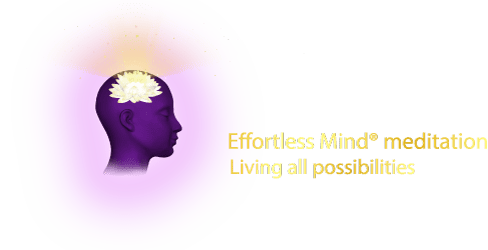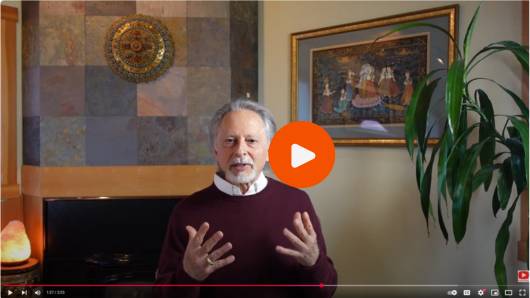Over the centuries, countless teachers and scriptures have recommended meditation as a great aid in growing towards peace, wisdom, and enlightenment. Today medical science has shown meditation to be effective in combating stress and in offering numerous benefits for physical and mental health, even possibly reversing some of the effects of aging. Yet even if we have an interest in meditating, we may find ourselves at sea without a rudder when it comes to learning how to do it. Where does one start? Can anyone learn to meditate, or does it take a special talent? What if I can’t silence my mind at all? What if my mind constantly boils with thoughts; is there hope for me, or should I forget meditation? For that matter, what exactly is meditation?
In this series of articles on meditation, I hope to answer at least some of these questions in a way that will offer practical help and guidance. In this first article, however, I will look more into the theory of meditation than the practice. Bear with me, for I realize that this first article may be perhaps the most difficult to follow. Having understood what meditation is, we can then more easily discover how to properly meditate and receive the greatest benefits.
What is meditation? One might give any number of definitions, but here is a good one to start with: Meditation is a process of making the mind subtle. From birth our mind is drawn outward by the senses towards the sense objects of the world. Our mind is ever engaged in the gross material world, and constant involvement in this gross level of material life makes the mind itself gross in its functioning. Indeed, this poses a great obstacle to realizing and living spiritual truths. As Christ said,
“You may hear and hear, but you will never understand; you may look and look, but you will never see. For this people’s mind has become gross; their ears are dulled, and their eyes are closed. Otherwise, their eyes might see, their ears hear, and their mind understand. . .” (Matthew 13:14-15)
As long as the mind is gross, we cannot clearly experience the subtler levels of reality, and it is the subtler levels of reality that relate to spirituality. We’re unlikely to perceive the presence of God, for instance, on the sensory or mental level at which we are used to functioning. God is not likely to drive up in a car one fine day, hop out, and shake our hand. Spiritual reality is only to be experienced on the subtlest level of existence, and ultimately beyond the subtlest level. Thus it is said in various Indian scriptures that we should seek “That which is subtler than the subtlest.” In fact, all spiritual experience depends entirely upon making the mind—and heart, as here mind is inclusive of thought and feeling—subtle. Meditation is the direct means to this goal.
To understand how meditation makes the mind subtle, we need to first consider the phenomenon of thought. Thoughts may seem to be the bane of a meditator’s existence, but the thought process is also the key to meditation. Meditation does, after all, have everything to do with thinking.
Consider: millions of thoughts appear in the mind each day. We take this constant parade of thoughts for granted, but even if we tried to stop them, they would continue to mysteriously appear. Most of us do not wonder even for a second where all these thoughts come from. Yet if we were to experience the source of our thoughts—an apparently inexhaustible source—we would find something very interesting: the innermost essence of the thinker. That, in fact, is the purpose of meditation: realizing the true, inner nature of one’s own life, one’s own Self. This is really the beginning of spiritual realization (as well as all the other practical benefits of meditation), for the true inner nature of our own life is what most intimately connects us with the source of life itself.
What is that innermost essence of the thinker? In a word, consciousness. We must be conscious to think. We must be conscious to feel. We must be conscious to perceive. Consciousness is the unseen basis of every moment of our experience of living. And were you to inquire more and more deeply into who you are, you would find that consciousness is the irreducible innermost essence of your Self. Even every thought, in fact, is simply a vibration or wave of consciousness.
If we go to the seashore and look out at the ocean on a calm day, we will see that waves begin as faint swells some distance from shore. Each wave rises and swells higher and higher, until it attains to its full height and finally breaks on the shore. Like these waves in the ocean, each wave of consciousness, each thought and feeling, also starts as a faint impulse deep within the mind. It then rises and swells until it becomes a fully formed thought that we consciously experience on the “shore” of the mind (the conscious thinking level). Ordinarily we do not pay attention to an ocean wave as it is in the process of swelling; it only grabs our attention once it is fully formed and breaks with a roar on the shore. Likewise, we do not experience the subtle swelling of an impulse of consciousness until it is a fully formed thought that “breaks” at the conscious thinking level of the mind. Only then does it grab our attention as a thought. By that time we are fully identified with the thought, caught in its grips.
Just as a wave that subsides becomes one with the ocean, so a thought wave that subsides becomes one with the ocean of consciousness. This experience only becomes significant, however, if it is an experience. That is, if we remain aware at each level of the process of a thought subsiding. Maintaining conscious awareness of a thought as it progressively subsides (and eventually dissolves into the ocean of pure consciousness) is the essence of meditation.
Spending some time each day allowing this process to happen, gradually cultures the mind to be subtler and subtler, and at the same time establishes the mind in its innermost being. This results in a mind/heart that is not only subtle, but at once clear, stable, supple, expansive, open, and whole. Through this process of meditation, we begin to live more and more of the wholeness of our own life, and this profoundly deepens our spiritual connection with life.




